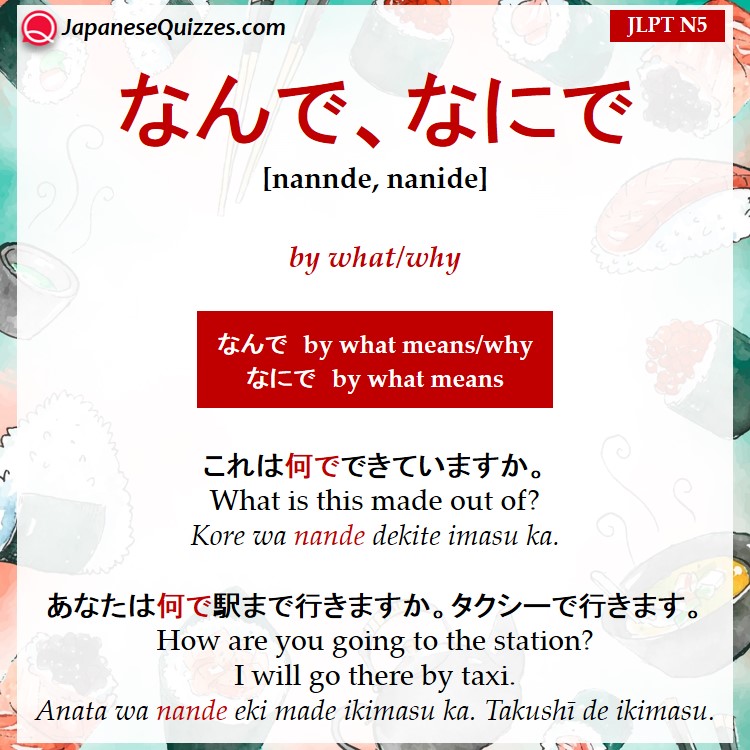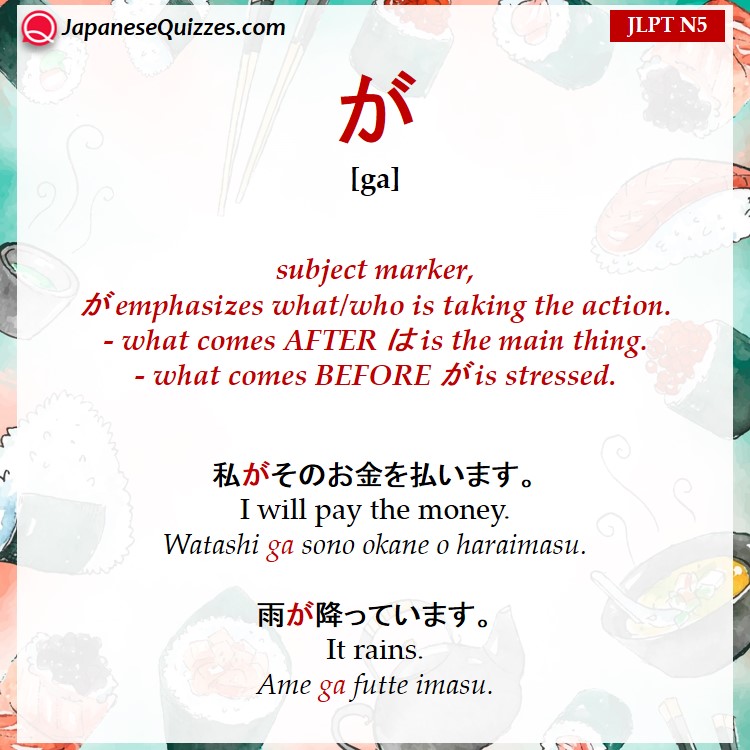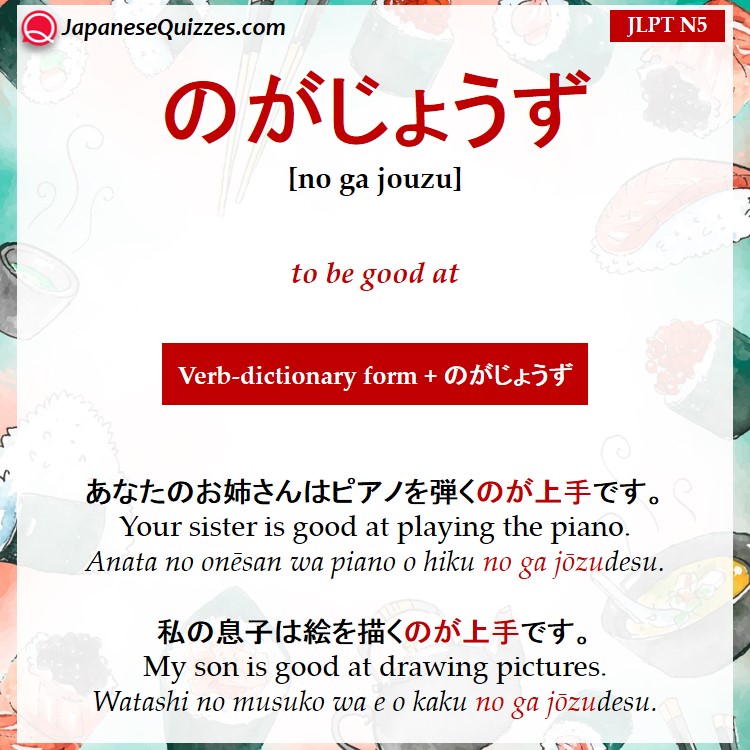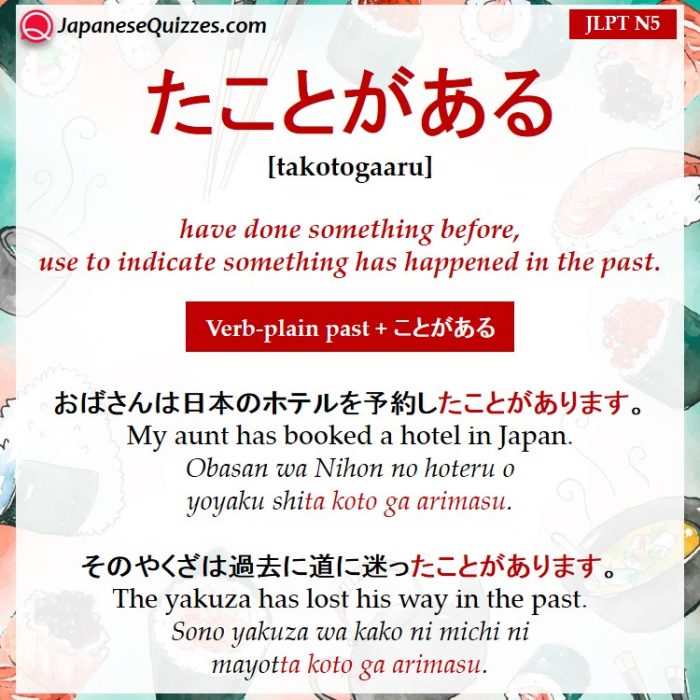
have done something before,
use たことがある to indicate that something has happened in the past.

Formations
Verb-plain past + ことがある
Examples
私は過去に日本語能力試験を 受けたことがあります。
Watashi wa kako ni Nihon gonōryokushiken o uketa koto ga arimasu.
I have taken the Japanese Language Proficiency Test in the past.
私は日本の企業に履歴書を送ったことがあります。
Watashi wa Nihon no kigyō ni rirekisho o okutta koto ga arimasu.
I have sent my resume to a Japanese company.
おばさんは日本のホテルを予約したことがあります。
Obasan wa Nihon no hoteru o yoyaku shita koto ga arimasu.
My aunt has booked a hotel in Japan.
大家さんは一日中、彼の猫を探したことがあります。
Ōka-san wa ichinichijū, kare no neko o sagashita koto ga arimasu.
The landlord sought his cat all day long.
奥さんは午前2時に洗濯ものにアイロンをかけたことがあります。
Okusan wa gozen ni-ji ni sentaku mono ni airon o kaketa koto ga arimasu.
My wife has ironed the laundry at 2 AM.
そのやくざは過去に道に迷ったことがあります。
Sono yakuza wa kako ni michi ni mayotta koto ga arimasu.
The yakuza has lost his way in the past.
See also
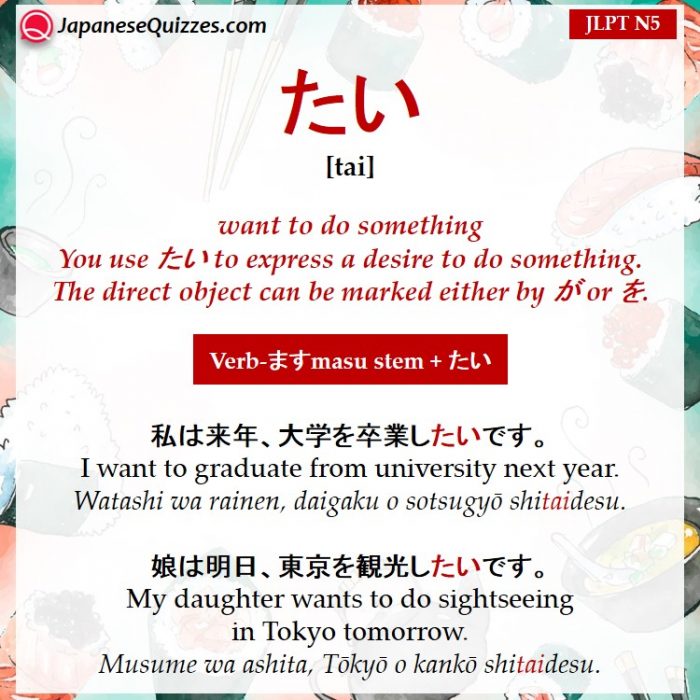
want to do something
You use たい to express a desire to do something.
The direct object can be marked either by が or を.
 Formations
Formations
Verb-ます(masu) stem + たい
Examples
私は明日7時に朝ご飯を食べたいです。
Watashi wa ashita shiti-ji ni asa gohan o tabetaidesu.
I want to eat breakfast at 7 o’clock tomorrow.
私は来年、大学を卒業したいです。
Watashi wa rainen, daigaku o sotsugyō shitaidesu.
I want to graduate from university next year.
私は5月に日本に行きたいです。
Watashi wa go gatsu ni Nihon ni ikitaidesu.
I would like to go to Japan in May.
娘は、明日、東京を観光したいです。
Musume wa, ashita, Tōkyō o kankō shitaidesu.
My daughter wants to do sightseeing in Tokyo tomorrow.
私は今日、おばさんとの約束を守りたいです。
Watashi wa kyō, obasan to no yakusoku o mamoritaidesu.
I want to keep a promise I made to my aunt today.
来月、大阪の本屋で日本語の教科書を探したいです。
Raigetsu, Ōsaka no hon’ya de nihongo no kyōkasho o sagashitaidesu.
I want to find a Japanese textbook at a bookstore in Osaka next month.
See also
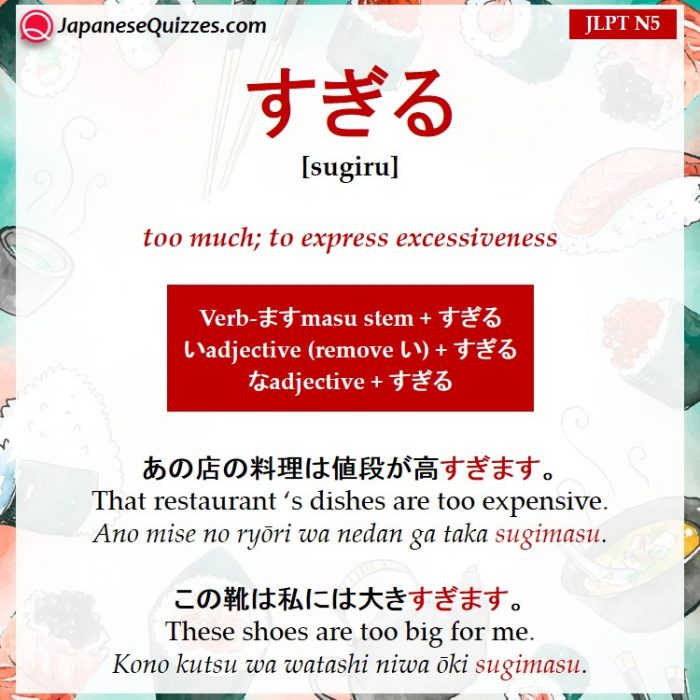
too much; to express excessiveness

Formations
Verb-ますmasu stem + すぎる
いadjective (remove い) + すぎる
なadjective + すぎる
Examples
弟はいつもお昼ご飯を食べすぎます。
Otōto wa itsumo ohiru gohan o tabe sugimasu.
My little brother always has lunch too much.
あの店の料理は値段が高すぎます。
Ano mise no ryōri wa nedan ga taka sugimasu.
That restaurant ‘s dishes are too expensive.
この靴は私には大きすぎます。
Kono kutsu wa watashiniha ōkisugimasu.
These shoes are too big for me.
このイスは私には低すぎます。
Kono isu wa watashiniha hiku sugimasu.
This chair is too low for me.
この問題は 大人には単純すぎます。
Kono mondai wa otona ni wa tanjun sugimasu.
This problem is too simple for adults.
あのインド料理レストランのカレーは子供には辛すぎました。
Ano Indo ryōri resutoran no karē wa kodomo ni wa kara sugimashita.
That Indian restaurant curry was too hot for children.
See also
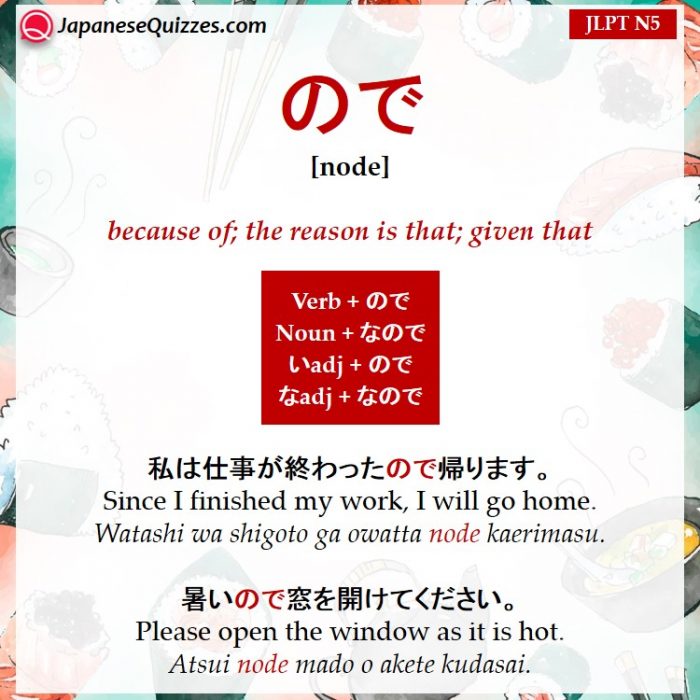
because of; the reason is that; given that

Formations
Verb + ので
Noun + なので
いadj + ので
なadj + なので
Examples
彼は寝過ごしたので学校に遅刻しました。
Kare wa nesugoshitanode gakkō ni chikoku shimashita.
He was late for school as he overslept.
私は仕事が終わったので帰ります。
Watashi wa shigoto ga owattanode karimasu.
Since I finished my work, I will go home.
ここは駐車禁止なので私たちは車を止めてはいけません。
Koko wa chūsha kinshinanode watashitachiwa kuruma o tomete wa ikemasen.
Since parking cars is prohibited here, we should not stop the car.
明日は休みなので、私は自分の部屋を 掃除したいです。
Ashita wa yasuminanode, watashi wa jibun no heya o sōji shitaidesu.
I am off for tomorrow, so I want to clean my room.
もう遅いのですぐに寝てください。
Mō osoinode suguni ne tekudasai.
Since it is already late, go to bed soon.
暑いので窓を開けてください。
Atsuinode mado o ake tekudasai.
Please open the window as it is hot.
邪魔なので、その椅子をどかしてください。
Jamananode, sono isu o dokashitekudasai.
As the chairs are in the way, put them away.
子供が大好きなので、ナオミは幼稚園の先生になるべきです。
Kodomo ga daisukinanode, Naomi wa yōchien no sensei ni narubekidesu.
Since Naomi likes children very much, she should be a kindergarten teacher.
See also

to be bad at something, to be not good at something

Formations
Verb-dictionary form + のが下手だ
Examples
私はダンスをするのが下手です。
Watashi wa dansu o suru no ga hetadesu.
I’m bad at dancing.
彼は運転するのが下手です。
Kare wa unten suru no ga hetadesu.
He is a bad driver.
彼女は絵を描くのがすごく下手です。
Kanojo wa e o kaku no ga sugoku hetadesu.
She is terrible at painting.
アリスはスペイン語を話すのがすごく下手です。
Arisu wa Supeingo o hanasu no ga sugoku hetadesu.
Alice is pretty bad at speaking Spanish.
アキラはいいわけをするのがとても下手です。
Akira wa īwake o suru no ga totemo hetadesu.
Akira is pretty bad at making excuses.
兄は名前を覚えるのが下手です。
Ani wa namae o oboeru no ga hetadesu.
My elder brother has trouble remembering names.
See also

to love / to like doing something

Formations
Verb-dictionary form + のがすき + だ / です
Examples
私はアニメを見るのが好きです。
Watashi wa anime o miru no ga sukidesu.
I like watching anime.
私はサッカーをするのが好きです。
Watashi wa sakkā o suru no ga sukidesu.
I like to play soccer.
私は朝、日本語を勉強するのが好きです。
Watashi wa asa, nihongo o benkyō suru no ga sukidesu.
I like to study Japanese in the morning.
ヒトミは歌うのが好きです。
Hitomiha utau no ga sukidesu.
Hitomi likes singing.
父は週末に料理をするのが好きです。
Chichi wa syu-matsu ni ryōri o suru no ga sukidesu.
My dad likes cooking on weekends.
彼女のお母さんは土曜日に映画を見るのが好きです。
Kanojo no okāsan wa doyōbi ni eiga o miru no ga sukidesu.
Her mother likes watching films on Saturdays.
See also



